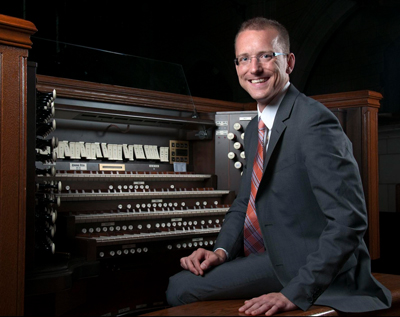by Daniel Hathaway

Lane, who served for a number of years as assistant organist at Harvard University’s Memorial Church, took up new duties last August at All Saints’ Episcopal Church in Brookline Massachusetts, “a wonderful parish that really cares about good music,” he said. Lane continues to serve as vice president of the American Guild of Organists, as well as chairing that organization’s new music initiatives. His recital at Plymouth Church in Shaker Heights on Tuesday, April 12 at 7:30 pm will bea co-sponsored by ArtsPlymouth and the Cleveland Chapter of the AGO.
Christian Lane’s Plymouth program will indeed be wide-ranging, including 11 works from a variety of historical periods. I asked him to talk through his repertoire.
“I’m going to hit the ground running with a good chunk of Baroque music totalling about 30 minutes. I’ll begin with the big Buxtehude g-minor prelude and fugue (BuxWV 149), then his large chorale-prelude, Nun bitten wir den Heiligen Geist, then J.S. Bach’s “Wedge” prelude and fugue in e-minor.”
Then Lane will move on to a more modern set. “The Scottish composer James MacMillan’s Offertorium (1986) is only about 5 minutes long, but it’s really emblematic of his style. Then, as a palate-cleanser, I’ll play Dan Locklair’s The Peace May Be Exchanged, a 2-½ minute piece many organists know. Nico Muhly wrote his Prelude on ‘Lasst uns erfruen’ for me. It’s relatively quiet, but shows a lot of Nico’s quasi-minimalist style. Canadian composer Denis Bédard’s Variations on ‘The Old Hundredth’ is quasi-Romantic, but should still work well on the crisp colors of the Plymouth organ. It’s a tune everybody knows.”
Lane said that his final set is probably the most diverse of the entire program. “It starts with Georg Muffat’s Toccata prima from his Apparatus music-organisticus of 1690 — a fantastic quasi-French, quasi-German, quasi-Italian piece in the Dorian mode. Felix Mendelssohn’s Theme and Variations in D of 1844 was originally written as a movement for a sonata that never materialized. It’s quiet and beautiful. Then Swiss composer-organist Guy Bovet’s Hamburger Totentanz builds up energy to a final, big g-minor chord that leads directly into Carson Cooman’s Gloucester Estampie, a spirited frolic with lots of frenetic energy.” (The title of Cooman’s piece refers to Gloucester, Massachusetts, the home of the C.B. Fisk organ company who built the most recent instrument in the Memorial Church at Harvard, where Cooman is on the staff.)
Christian Lane’s Cleveland program reflects his commitment to commissioning and performing new repertoire for the organ, an interest which has led to his official involvement with the American Guild of Organists’ new music programs. “Part of my role for the last four years has been to oversee the Guild’s new music initiatives, including the Marilyn Mason Competition for new organ works and its equivalent for choral music, the ECS Publishing Competition.”
The Guild’s longstanding competitive programs have been altered a bit over the years, Lane said. “We’ve transitioned from having composers submit scores to having them submit proposals for commissions, and we’ve had much more participation as a result. It’s a more attractive way of engaging composers, and our numbers reflect that. The Pogorzelski-Yankee $10,000 prize helps us attract first-class composers like Indiana University professor Claude Baker, who at the age of 60 had never written for the organ before. He said that was a transformative experience, and he’s going to continue composing for the instrument.”
The Guild also offers $1,000 grants to pairings of composers and organ students. “That gives composers an incentive for writing for the organ, and the organists can mentor them through the process. The rules of the competition also guarantee that pieces will have not only premieres but multiple performances.”
In addition to his church and Guild work, Christian Lane is also a laureate of the Canadian International Organ Competition. He’ll be the second gold medalist of that contest to appear in Cleveland in a month, the most recent winner, David Baskeyfield, having played a recital at Fairmount Presbyterian Church in March. I asked Lane why he thinks competitions are valuable experiences for organists.
“Participating and winning are two different things. For me, it’s more about the experience of going through the process,” he said. “The basic value is having a deadline and a focused project to work towards. Once there, I had the opportunity to be heard by people who wouldn’t necessarily hear me from day to day, to meet colleagues I’ve stayed in touch with, and judges I wouldn’t otherwise have gotten to know. Particularly with the Canadian competition, they really see winning the prize as only the beginning of a relationship. They’re very proactive in cultivating the current winner during the three-year prize period by promoting them and getting them a lot of concerts. Unlike most competitions, they’re uniquely set up to be able to do that. It’s run as a year-round festival that sponsors performances between the competitions, and it has the infrastructure to be able to think bigger than just holding a single event.”
Published on ClevelandClassical.com April 7, 2016.
Click here for a printable copy of this article



